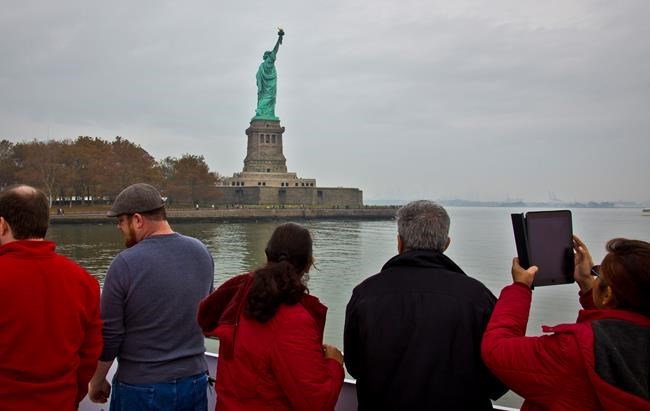Beth J. Harpaz

FILE - In this Nov. 5, 2015, file photo, visitors view the Statue of Liberty during a ferry ride to Liberty Island in New York. The travel industry is debating whether President Donald Trump's ban on travel from seven countries will have a larger impact on tourism in the U.S. Some experts say the controversy will have no effect while others worry that it sends an unwelcoming message to travelers around the world. An op-ed piece in the Toronto Star this week encouraged Canadians to boycott the U.S. for now, saying that the Statue of Liberty will still be there in a few years. (AP Photo/Bebeto Matthews, File)
February 08, 2017 - 10:38 AM
NEW YORK - President Donald Trump's travel ban is not only being debated in the courts, it's also being debated by the travel industry.
Many experts remain bullish about prospects for tourism, despite a strong dollar that makes the U.S. expensive for some international travellers. The U.S. Commerce Department predicts a record 78.6 million international visitors will visit the U.S. in 2017.
Brand USA, which promotes travel to the U.S., said it has "not received any data that shows any tangible change in bookings or cancellations by international travellers."
But others worry that Trump's order banning travellers from Iran, Iraq, Libya, Somalia, Sudan, Syria and Yemen may scare off visitors from elsewhere.
An op-ed piece in the Toronto Star newspaper last week encouraged Canadians to "boycott vacations to the U.S." until Trump's term is over. "The Grand Canyon will still be there," the piece said. "The Golden Gate Bridge. Mount Rushmore. Disney World. They'll all be there. And with any luck, the Statue of Liberty will still be there too."
Travel agent Melissa Erskine, owner of iDream Travel based in Ontario, Canada, says some of her clients "are no longer interested in going to the U.S. due to Donald Trump's policies and have looked at other options within Canada. I just booked flights for two families to New York City for April and they have taken out trip cancellation insurance ... They wanted peace of mind that they can cancel their trip if needed."
Fred Dixon, CEO of NYC & Company, New York's tourism agency, said Canada is New York's second-biggest international market after the United Kingdom, "so when our neighbours to the north call for a boycott, it's a huge cause for concern."
Travellers from the Middle East comprised just 3.6 per cent of non-resident international arrivals to the U.S. in the first half of 2016, according to U.S. Department of Commerce data. The president's order does not include the Middle Eastern countries that send the most travellers here — Israel, Saudi Arabia and Turkey.
But Dixon and others fear travellers around the world may interpret the ban as a broader message that they're not welcome here.
"We are very concerned from a perception perspective that the U.S. has an image problem," said Dixon. "New York is hypersensitive to this. We have 30 per cent of all the overseas travellers who come to the U.S. Half of all the spending on travel comes in the form of international travel."
Some data suggests a downturn in bookings in the days after the ban was announced. StudentUniverse.com, a site geared to travellers ages 18-26, said bookings from the United Kingdom to the U.S. dropped 19 per cent between Jan. 27 to Feb. 7 compared to the same period last year. ForwardKeys, which analyzes 16 million flight reservation transactions a day, said bookings to the U.S. dropped 6.5 per cent between Jan. 28 and Feb. 4 compared with the same period in 2016.
Jason Clampet, editor in chief at the travel industry website Skift.com, said the ban, combined with the strong dollar, gives international travellers "another reason to shop elsewhere."
Others, however, say demand for U.S. vacations has never been stronger. Intrepid Travel expects to bring record numbers of travellers to the U.S. in 2017. Contiki Tours president Melissa da Silva says bookings to the U.S. have increased 30 per cent since last year.
Tony Daly, with Ranch Rider, a British-based travel company, said interest in riding and ranch vacations in the American West remains robust. While he's seen some research suggesting some British travellers are reconsidering U.S. trips, "that's not the whole story. The results also show there are large numbers of U.K. travellers who either agree with or who are undecided based on the recent (Trump) order."
Madelyn Fitzpatrick, with the Los Angeles branch of Hylink, one of China's largest digital advertising agencies, said Chinese travellers are also not put off by Trump, who she said is seen as a celebrity president in China. "America is a destination for experiences and local cultural exploration, so its politics do not affect the traveller, unless we begin to see dangers or threats," she said.
On Tuesday, the U.S. Travel Association said revenue in the U.S. related to international travel returned to pre-9-11 levels just last year. "The U.S. lost a significant amount of ground in the international travel marketplace in the years after 9-11, which our industry has come to call 'the Lost Decade,'" USTA CEO Roger Dow said in a statement.
While everyone agrees that counterterrorism and security measures are essential, some worry about a repeat of that post-9-11 tourism decline.
USTA spokesman Jonathan Grella said the Trump travel ban has a "potential dangerous ripple effect. ... People make (travel) choices based on policies, based on protests of those policies, based on fear. The fallout could be wide-ranging."
News from © The Associated Press, 2017